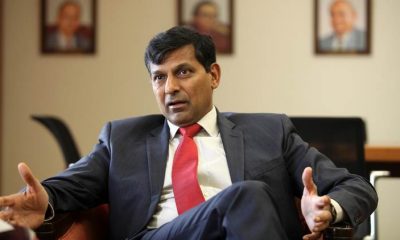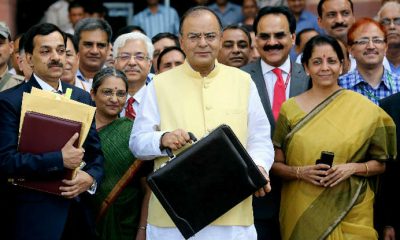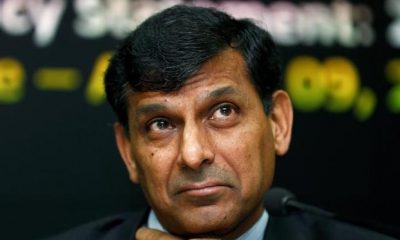National
Raghuram Rajan’s no to 2nd RBI term,says academia beckons him
 Mumbai:Ending months of suspense, Reserve Bank of India (RBI) Governor Raghuram Govind Rajan formally told his colleagues on Saturday that he is not keen on a second term at the helm of the country’s central bank and will return to academia when his tenure ends in September.
Mumbai:Ending months of suspense, Reserve Bank of India (RBI) Governor Raghuram Govind Rajan formally told his colleagues on Saturday that he is not keen on a second term at the helm of the country’s central bank and will return to academia when his tenure ends in September.
This was conveyed in a 888-word letter addressed to the RBI staff, a copy of which was obtained by IANS — one in which he has listed what the central bank has managed to achieve in the past three years and what remains to be done, although that process has also been initiated.
Reflecting on his term as the 23rd governor of the central bank since September 2013 — which has seen praise and also a fair share of criticism — Rajan said the agenda pursued by his team was to help nurse India back on the path of recovery first, and then growth, and keep prices in check.
He went on to allude that much was accomplished, even as a part of that onerous task remained a work in progress — while also indicating that he was ready to see that through as well, but eventually decided against it.
“While I was open to seeing these developments through, on due reflection, and after consultation with the government, I want to share with you that I will be returning to academia when my term as governor ends on September 4, 2016,” he said.
“I will, of course, always be available to serve my country when needed,” he added.
“I am an academic and I have always made it clear that my ultimate home is in the realm of ideas. The approaching end of my three year term, and of my leave at the University of Chicago, was therefore a good time to reflect on how much we had accomplished.”
Stating that he will be returning to the US university, from where he is on a sabbatical, Rajan listed his unfinished agenda as seeing a monetary policy panel in place to broadly guide the central bank, and a clean-up of banks’ balance sheets.
Listing the achievements, since the time India’s growth was high and inflation also high when he took over, the governor said price control, improving foreign exchange reserves, currency stability, an eventual lowering of interest rates and extending a helping hand for reforms stood out.
He hoped the unfinished agenda for which the path had been paved will be pursued by his successor — the 24th governor of the Reserve Bank — again a matter of much debate and interest, with some names already doing the rounds.
Much speculation had gone into a possible second term for Rajan, hailed by many as the best governor the central bank could have possibly had on its board during the difficult times India was going through, but also with some share of critics.
In fact, a petition that was floated online pushing for a second term for this IIT alumnus, had tens of thousands of netizens rooting for him, even as some critics like BJP leader Subramanian Swamy were particularly harsh towards him, asking Prime Minister Narendra Modi to let him go.
Both Modi and his Finance Minister Arun Jaitley remained silent all along.
But speculation gathered much momentum when Anandabazar Patrika, quoting sources close to Rajan, said in a report he was not interested in a second term, which got some credence when Modi said: “I don’t think this administrative subject should be an issue of interest to the media.”
Now that he has said no, RaghuramRajan is the hashtag trending at the top, mostly in his support.
Infosys co-founder N.R. Narayana Murthy, who has been batting, in fact, for not one but two more terms for Rajan, said: “Have no doubts he will continue to add value to the country. He deserves more dignity than what he was treated with.”
Swamy remained unrelenting. “Raghuram Rajan was an employee of the Government of India. We don’t select employees on the basis of popular vote — and, too, of industrialists,” he said.
Politicians seldom like someone outside their tribe shooting off his or her mouth. But a doctoral degree holder from the Massachusetts Institute of Technology, Rajan has always been outspoken — often getting pushed onto the wrong side of a debate.
The latest being his remarks on India being the king in a land of the blind which did not go down well with many, particularly the BJP leadership and notably Commerce and Industry Minister Nirmala Sitharaman.
But Rajan, who has also served in the International Monetary Fund, has been used to such critics.
Before he shot to global fame with his prediction of a looming global financial crisis way back in 2005, he had to face ridicule from such luminaries as then Federal Reserve chief Alan Greenspan and Nobel laureate Paul Krugman.
He had the last laugh, so to say, when that became a reality.
What had started as an academic paper titled “Has Financial Development Made the World Riskier?” also eventually resulted in an Academy Award-winning documentary called “Inside Job”, bringing Rajan further into global limelight.
National
Foodman Vishal Singh Honored for Hunger Free World Mission in Bangkok

Lucknow: Vishal Singh, a renowned social worker from Lucknow, also known as Foodman, has once again made India proud. He was honored by the Happy Hands Gloves Cooperative Limited Company in Korathai, Thailand, for his work with the Hunger Free World Mission.
The Hunger Free World Mission’s meeting was held in Korathai, Thailand, under Vishal Singh’s leadership. Representatives from several countries, including Mr. Raja Dwivedi (Managing Director of Happy Hands Gloves Limited), Thailand Coordinator Mr. Raja Mishra, and member Mr. Varun Singh, attended the event.

Under Vishal Singh’s leadership, the attendees took a pledge to work together toward creating a hunger-free world.
Speaking on the occasion, Vishal Singh explained that the main goal of the Hunger Free World Mission is social participation. He said the mission is not just about feeding people but also about meeting other basic needs of those who are struggling. The mission focuses on helping families of terminally ill patients in hospitals by providing food and shelter. It also works to fulfill essential needs like education, jobs, and care for the elderly.
For the last 16 years, the Vijay Sri Foundation has been providing free services, benefiting thousands of people. Vishal Singh highlighted that the mission aims to gain global recognition like other organizations such as WHO, WWF, and Red Cross, which work for social causes.
During this meeting, Vishal Singh was appointed as the Chairman of the Hunger Free World Mission by representatives from various countries. They also discussed holding regular meetings in different countries to push the mission forward.
Business tycoon Dr. Abhishek Verma has also supported this humanitarian mission, vowing to promote the idea of “Seva Parmo Dharma” (Service is the highest duty) worldwide. Vishal Singh praised him, stating that people like Dr .Abhishek Verma inspire others to work for the betterment of society.
Recently, Romania’s Ambassador, Mr . Daniela Sezonov Ţane, invited Vishal Singh to the Romanian Embassy in Delhi, where they discussed the mission in detail. Impressed by his humanitarian work, she honored Vishal Singh and invited him to Romania to take the mission forward .
Food man Vishal Singh has been serving the people of India for the past 16 years. Through the Vijay Sri Foundation, he provides free meals to cancer patients & their families ,shelter, and education for women & children along with running free old-age homes in Lucknow.
In addition to his humanitarian work, Vishal Singh also addresses issues like crime and corruption through his role as Chairman of Seva Path Media and Managing Director of Vijay Sri Foundation.

During the COVID-19 pandemic, Vishal Singh and his team worked tirelessly to provide food and help to the needy, including starving children, elderly citizens, and pregnant women. Despite contracting the virus himself, he continued to assist others after his recovery. He even created a life-saving oxygen regulator using household items, which was praised by doctors both in India and abroad.
In his address at the meeting, Vishal Singh spoke about his mission to create a hunger-free world. He pointed out that India’s large population, along with issues like unemployment and poverty, has caused the country to fall on the Hunger Index. He urged people to contribute just one handful of grains daily to help create a hunger-free world.
He concluded by saying that through social participation, we can empower the people around us, meet their basic needs, and work together to build a stronger, more prosperous, and developed society.





















